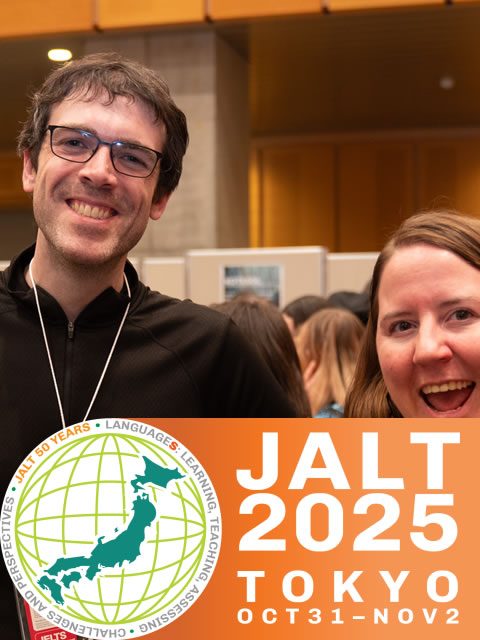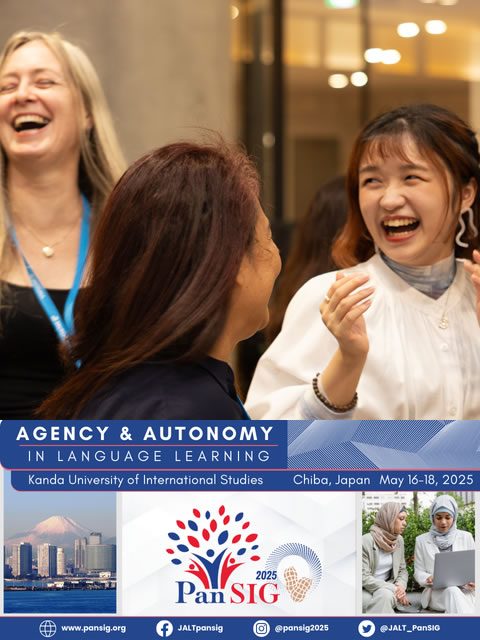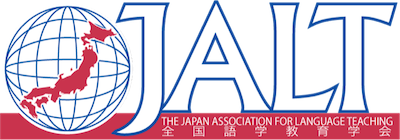Your cart is currently empty!
Featured Speakers
•
A. The reflective teacher: Towards self-actualization
Andrew Boon
Toyo Gakuen University
Sponsored by englishbooks.jp
(Saturday, November 19 12:40 PM – 2:10 PM)
In the act of teaching, we have little time to reflect on the successes or puzzles that occur within our classes and can lose valuable opportunities for gaining insights into our pedagogic practice. There is a need, therefore, for practical ways to help us think back upon our experiences more deeply and to discover what is actually happening in our classrooms. This workshop discusses the process of becoming reflective and the journey towards pedagogic self-actualization. It also provides a number of strategies and frameworks that can be used by teachers to facilitate critical reflection on their teaching and find new discoveries, possibilities, and ideas for research themes there.
Andrew Boon is an associate professor in the faculty of humanities at Toyo Gakuen University. He has been teaching in Japan for over 13 years and is an Aston University PhD student. He has been an active member of JALT since 2004, has presented at numerous conferences, and has published several articles on teacher development, motivation, and methodology. At the time of writing, he is currently working on a new coursebook, Discover the News with David Harrington (Language Solutions, 2011).
B. Education for World Citizenship: Language, Culture and Global Issues
Kip A. Cates
Tottori University
Sponsored by Cengage Learning
(Saturday, November 19 12:40 PM – 2:10 PM)
In our globalized world of the 21st century, we need young people who can communicate effectively in foreign languages, who appreciate the cultural diversity of our global village, who strive to promote international understanding and who can contribute to solving the global issues that face our planet. This requires an approach focused on “teaching for world citizenship” designed to stimulate interest in the wider world, promote cross-cultural empathy, foster critical thinking and encourage social responsibility. The foreign language classroom can be an exciting place for students to acquire this “global literacy” as they develop language and communication skills. This featured speaker workshop will explain how a global education approach to language teaching can help prepare young people for socially responsible citizenship in a multicultural world. It will outline how teachers can bring an international perspective into their classrooms through resources, materials and activities featuring meaningful content on real-world topics.
Kip A. Cates is a Professor in the Faculty of Regional Sciences at Tottori University, Japan. He works in the field of global education and language teaching as a writer, speaker and teacher trainer. He is the coordinator of JALT’s Global Issues Special Interest Group and publishes its Global Issues in Language Education Newsletter. He is a founder of the Asian Youth Forum (AYF), a past chair of TESOLers for Social Responsibility (TSR) and an advisor for the NGO Peace Boat. He has worked, lived or traveled in 50 countries and speaks nine languages.
C. Using genre pedagogy to support the development of oral skills
Philip Chappell
Linguistics, Macquaire University
Sponsored by Macquarie University
(Saturday, November 19 3:50 PM – 5:20 PM)
Second language learners who are in high enclosure settings (with restricted access to authentic language use by the target discourse communities) can have greater difficulties than others in learning the discourse conventions of those communities. Genre-based teaching (GBT) is designed to bridge this gap and has achieved successes in the teaching of literacy skills. It can also be applied to the teaching of oral language skills. In this workshop, the theoretical background to GBT will be explored. Participants will carry out explorations of texts which represent different spoken genres, analyzing the texts at a variety of levels. Following this, the GBT framework will be introduced, and participants will have the opportunity to reflect upon and discuss how appropriate GBT is for their own teaching contexts. Upon completion of this workshop, participants should have a clearer idea of the theoretical bases of GBT, have exposure to analyzing spoken texts, and have considered the pedagogic framework of GBT.
Phil Chappell is Lecturer in Linguistics at Macquarie University and convenes the Postgraduate Certificate in TESOL. Phil has been involved in English Language Teaching, Language in Education/Applied Linguistics and ELT program management since the early 1990s. He spent over ten years living in Thailand, where he was involved with adult language teaching, language teacher education, curriculum development, program management, distance TESOL education and developing in-service professional development programs. Phil’s research interests are aimed at achieving greater understandings of effective classroom practices in second language teaching and learning, especially the talk of the language classroom.
D. Teaching, learning and growing in a global context: Activities for teaching young learners
Fiona Copland
Languages & Social Sciences, Aston University
Sponsored by Aston University
(Sunday, November 20 3:45 PM – 5:15 PM)
In this workshop, we will look at example activities for teaching young learners suggested by teachers of English around the world as part of the Aston University/ British Council project, “Tasks for Teaching Young Learners.” We will ask, “Would these activities work in my learning and teaching context?” and “What adaptations would be necessary to make them work?” Workshop participants will be invited to bring their own favourite activities on a sheet of A4 paper to hang on the “Best Activities” line for sharing with others. Participants at the workshop should leave with an understanding of the challenges faced by young learner teachers around the world and how some of these challenges are met. They should also leave with some great new ideas to try out in their own classrooms.
Fiona Copland has taught English to speakers of other languages in Nigeria, Hong Kong, Japan and UK. She has taught children and adults in a range of contexts from junior high schools to private language schools. For the last twenty years, Fiona has also been involved in teacher education. She has worked on CELTAs, DELTAs and a number of university programmes. She is currently Course Director for MSc TESOL programmes by distance learning at Aston University. Fiona holds a Master’s in Applied Linguistics and a PhD in Education. Her research interests include teaching young learners, using L1 to teach L2, and feedback in teacher education programmes. She is a fellow of the UK Higher Education Academy and treasurer for the UK Linguistic Ethnography Forum, a special interest group of BAAL.
E. What makes a good teacher? Studying expertise in teaching skills
Keith Johnson
Emeritus Professor of Linguistics and Language Education,
Co-sponsored by the Teacher Education & Development SIG and the College and University Educators SIG
(Saturday, November 19 3:50 PM – 5:20 PM)
What characteristics do expert language teachers have? What do they do in the classroom that distinguishes them for non-experts? Why is it important to know? The workshop will stimulate discussion around questions like these. Participants will be invited to watch some portions of lessons taught to teachers of varying levels of experience, and will be asked to note differences between them. This will lead to discussion about important characteristics of language teaching expertise. We will also considered how knowledge about the behaviour of expert teachers can help us as teacher trainers. Presumably understanding good teachers will help us create good teachers. But if so, how exactly? In the course of the workshop, a number of small-scale language teaching expertise studies undertaken at Lancaster University will be briefly described.
Keith Johnson started his career as a teacher of English and linguistics in Croatia, Malta and Italy, before moving to the Centre for Applied Language Studies at the University of Reading in 1974 and joining Lancaster University’s Linguistics Department in 1994. His years of teaching on MA programs produced An Introduction to Foreign Language Learning and Teaching (2008). At Lancaster he founded the research group LATEX (LAnguage Teaching EXpertise); see Expertise in Second Language Learning and Teaching (2005). Other influential publications include the 1979 titleThe Communicative Approach to Language Teaching (co-editor C.J. Brumfit), 1981’s Communication in the Classroom (co-editor K. Morrow), Communicative Syllabus Design and Methodology in 1982, and 2003’s Designing Language Teaching Tasks. Currently, he is pursuing an interest in the language of Shakespeare, as well as developing his interest in expertise.
F. The M ‘n M’s of Teaching English to Young Learners: Using Music, Movement, and Multiple Intelligences
Kathy Kampa
Author, teacher, and teacher trainer
Sponsored by Oxford University Press
(Saturday, November 19 11:00 AM – 12:30 PM)
Discover the power of music, movement, and multiple intelligences (MI) to create a dynamic learning environment for your students. Music is celebrated in many cultures around the world. Its universality can be found in its shared structures. Music enhances memorization, a critical process in language acquisition. Movement invites students to learn by doing, a process that builds neural networks in the brain and throughout the body. However, are music and movement effective for all learners? Do we need more ways for students to learn? In this session, we’ll look at how music and movement can help young learners succeed in the EFL classroom. We’ll look at how multiple intelligences strategies can complement music and movement. We’ll explore ways in which these strategies can be used immediately in your classroom. Join us as we sing, move, and let all of our intelligences soar!
Kathleen Kampa has specialized in working with young learners. In her thirty years of experience in teaching children, she has created songs, chants, and movement activities targeted at young learners’ needs. Kathleen and her husband Charles Vilina are co-authors of Magic Time, a starter level English course for young learners published by Oxford University Press. She is also a co-author of Everybody Up, a new primary course published by OUP. Kathleen has written extensively on music, movement, and multiple intelligences, and has given numerous workshops in the US, Canada, Japan, Korea, Taiwan, Thailand, Finland, Holland, and Jamaica.
G. Encouraging learner creativity
Chris Kennedy
Center for English Language Studies, University of Birmingham
Sponsored by University of Birmingham
(Sunday, November 20 11:30 AM – 1:00 PM)
Most teachers are creative people, would like to teach in a creative way, and would like their students to learn creatively, both so that they can get more out of their English language studies, but also so that it might help them in their future careers. We shall be looking at two types of creativity, both linguistic and literary, and see in what ways we can raise students’ awareness of examples particularly in relation to the use of English as a global language. Such examples might involve some exposure to simple literary texts but also to non-literary examples of creativity in bilingual linguistic landscapes such as signs and advertisements especially those involving new Englishes. We shall discuss encouraging students to produce creative examples themselves. I welcome also participants’ experiences of creativity from their own classrooms.
Chris Kennedy has worked as teacher, trainer, adviser, and academic in Africa, the Middle East, South-East Asia, and South America. His research and publications focus on Language Policy, Curriculum Innovation, and English as Global Language, with interests also in Primary ELT, Professional Communication and Applied Corpus Linguistics. He is a Past President of IATEFL. He is Director of the Centre for English Language Studies at the University of Birmingham UK, which runs Masters and PhD programmes, including a distance Masters in TEFL/Applied Linguistics which is offered world-wide and which has substantial numbers of participants in Japan and Korea.
H. Learning what learners need
Tom Kenny
Nagoya University of Foreign Studies
Sponsored by Cambridge University Press Japan
(Sunday, November 20 3:45 PM – 5:15 PM)
The “conversation class” is arguably the least-regarded form of language education in a curriculum. All too often there is the mistaken attitude that any native speaker can teach it, one book is as good as another. It is a matter of occupying students’ time for a ninety-minute class period while they perform some activities that make them speak English. No individual guidance from the teacher is necessary (or possible); nothing tangible is produced by the learner. It’s “conversation,” and unworthy of academic attention. In this hands-on workshop, the presenter will work with participants to tear-down this image and replace it with a methodology that focuses on a feedback-oriented approach to improving students’ spoken English. Presentation and discussion will include ways to: capture student talk, analyze it, perform a needs analysis, decide what aspect of the talk needs to be addressed most of all, give feedback, deliver feedback, and archive student talk and teacher feedback.
Tom Kenny is author of Nice Talking with You (Cambridge), which remains one of the most popular English conversation textbooks in Japan. He is also author of the 4-level Listening Advantage series, published by Heinle-Cengage Learning. He is associate professor of linguistics at Nagoya University of Foreign Studies in central Japan, where he serves as chief coordinator of the oral communication program for the Department of British and American Studies, and as director of the university’s Speaking Lab, a premiere e-learning facility.
I. Entering the conversation, joining the community: Legitimate participation in academic publishing
Theron Muller
Noah Learning Center
Sponsored by Shinshu JALT
(Sunday, November 20 11:30 AM – 1:00 PM)
This interactive workshop is divided into two parts. The first illustrates how audience members can become legitimate participants in academic publishing by explaining different journal systems, including The Language Teacher, the JALT Conference Proceedings, and the Asian EFL Journal family of journals. Attention will be given to where participants can contribute by becoming members of the journals’ communities of practice, through volunteering or through authoring papers for publication. The second part will cover successful production of academic discourse. It will include activities like changing samples of academic papers to better meet publication requirements, and will also consider how writers can successfully access the resources necessary for successful academic production. Participants should expect to gain a better understanding of the systems of academic journals, where they could become participants in those systems, and how they can approach writing articles which have a greater chance of being accepted.
Theron Muller is a teacher and researcher based in Japan. His publications include exploration of TBL and academic publishing. He is also lead editor on two book projects related to EFL. Currently his research interests include investigating the experiences of authors pursuing academic publication and journal review systems. He is active with JALT Publications, an Associate Editor with the Asian ESP Journal,part of the University of Birmingham CELS Open Distance Learning team, and an active member of MASH Collaboration, where he is an instructor for the online MASH Academic Publishing course.
J. Getting Started with Quantitative Research: A First Study
Gregory Sholdt
Kobe University
Co-sponsored by Osaka JALT and MASH Collaboration
(Saturday, November 19 11:00 AM – 12:30 PM)
Making the transition from teacher to teacher-researcher can result in a range of classroom and career benefits: from improved learning environments and deeper professional satisfaction to publications and job opportunities. However, getting started in classroom-based research can be a bewildering endeavor without training or guidance. The goal of this workshop is to provide a template for a simple and versatile quantitative research design that can be adapted to fit a variety of research topics and can be implemented in most language classroom settings. Working together in small groups, participants will explore potential research topics, complete a set of worksheets that outline the key steps of a quantitative study, and leave the workshop with a clear research plan tailored to their personal interests. Additionally, the presenter will introduce and explain a unique opportunity for teachers to join a collaborative research project built on this approach to professional development through classroom-based research.
Gregory Sholdt teaches in the School of Languages and Communication at Kobe University. His interests include teacher development, classroom-based research methods, English for academic purposes, and fluency instruction. Based on his graduate studies and teaching of introductory statistics courses at the University of Hawaii, he has been exploring innovative approaches to professional development through classroom-based research. He has developed and given a number of professional development workshops and presentations throughout Japan and created an online research methods course in 2009 for language teachers through MASH Collaboration. He currently serves on the Editorial Advisory Board for the JALT Journal.

JALT2025 International Conference
2025年10月31日(金)〜2025年11月02日(日) 東京都渋谷 国立オリンピック記念青少年総合センター Friday, October 31 – Sunday, November 02, 2025 • National Olympics Youth Memorial Center, Tokyo, Japan

PanSIG Conference
PanSIG 2025 will be held May 16-18 in Chiba. PanSIG is an annual conference organized by JALT’s Special Interest Groups (SIGs).
